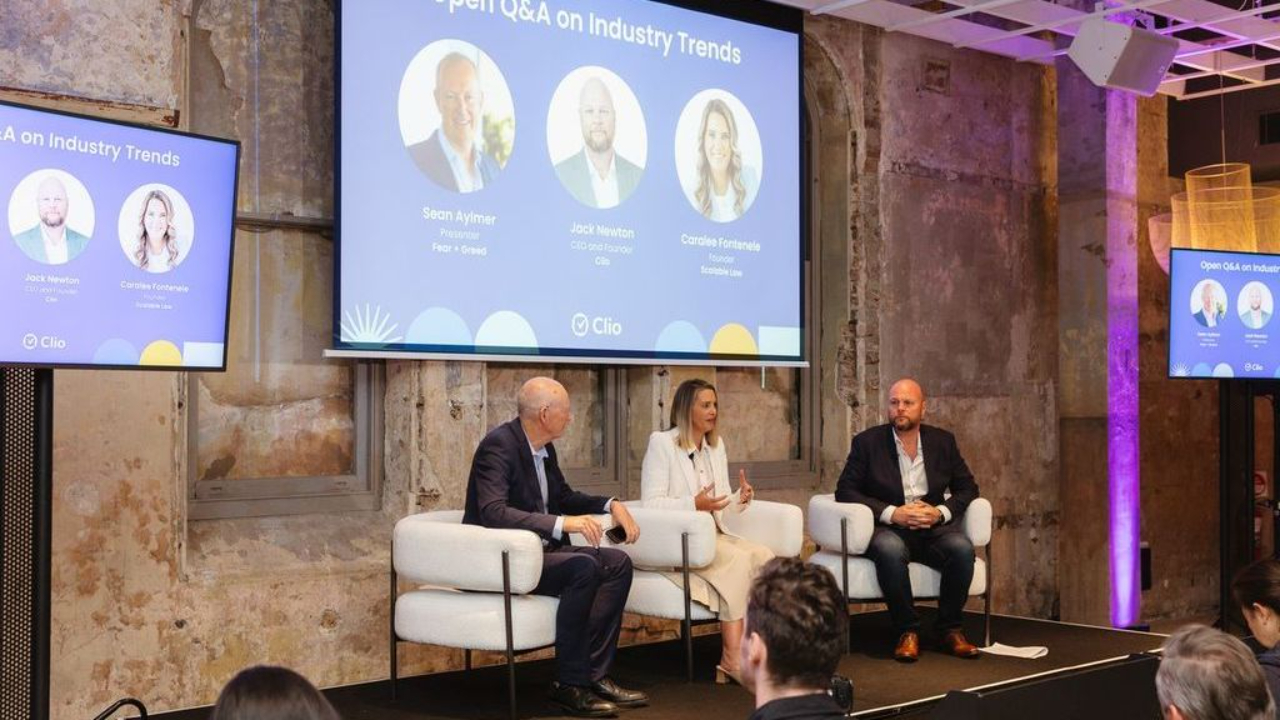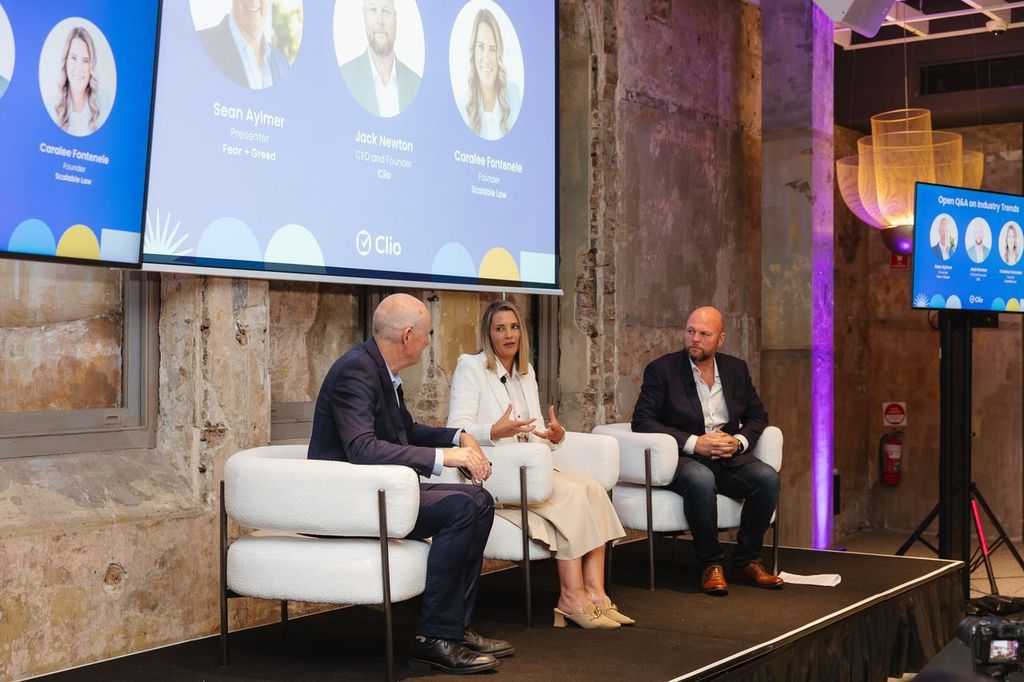How Technology Is Reshaping Australian Law Firms: My Experience on the Fear & Greed Podcast

Why Conversations Like This Matter
Appearing on Fear & Greed, Australia’s leading business podcast, to speak about technology and the future of the legal industry was one of those moments that made me pause and think about how far the profession has come. As the founder of Scalable Law and a long-time law firm owner, these conversations matter deeply to me because they shape how we lead our teams, serve our clients, and grow sustainable businesses.
The episode, created in partnership with Clio, opened the door for a much-needed discussion. For years, law firms resisted digital transformation, believing innovation belonged in tech companies, not legal practices. But the reality is simple: technology isn’t a threat. It’s the greatest opportunity modern law firm owners have to create consistency, profitability, and freedom.
This blog is my first-person reflection on that conversation, what it means for the industry, and why technology is no longer optional for firms that want to thrive.
The Legal Industry Is Changing Faster Than We Realise
When I started my own firm years ago, everything was manual. Files, calendars, client notes, task management, conflict checks, accounting, marketing, all of it depended on humans constantly remembering what needed to be done.
Human-powered systems are the biggest reason most law firm owners feel exhausted. There are too many moving parts, too many client matters, too many compliance requirements, and too much pressure for anyone to hold it all together without the right tools.
On the Fear & Greed interview, I spoke about this shift. Today, cloud-based platforms like Clio have completely redefined how firms operate. What used to take hours now takes minutes. What used to rely on memory now relies on streamlined workflows. What used to cause panic on Monday morning is now automated, consistent, and predictable.
This isn’t theory. This is my lived experience
and the experience of the law firm owners I coach every day inside Scalable Law.
Why Technology Isn’t Replacing Lawyers, It’s Elevating Them
One of the most common fears I hear from lawyers is that technology will replace the profession. I understand the concern, but the truth is much more empowering.
Technology isn’t replacing lawyers. It’s replacing inefficiency.
It’s replacing double handling, unnecessary admin, lost time, forgotten tasks, and bottlenecks that frustrate both your team and your clients.
During the Clio and Fear & Greed discussion, I explained that when you introduce the right systems, particularly legal-specific platforms, you actually create more space to be a better lawyer. You think more clearly. You lead more effectively. You have more time to spend with clients, strategise matters, build your team, and operate like a business owner instead of an on-call technician.
The firms that embrace tools like Clio are not becoming less human. They’re becoming more human because owners finally get the breathing room to think, plan, and grow.
The New Expectations of Law Firm Clients

Clients today are different from the clients we served a decade ago. They expect speed, clarity, transparency, and communication. They want real-time updates, online payments, digital signatures, and appointment booking that doesn’t require six back-and-forth emails.
Technology makes this possible.
In the event, we spoke about how clients are now comparing law firm service delivery with every other digital experience in their life. Uber updates them every few seconds. Banking apps show real-time balances. Airbnb sends automated touchpoints without anyone lifting a finger.
If your law firm is still relying on paper files or clunky legacy systems, the gap is widening every day, not because your legal skills aren’t strong, but because the client experience doesn’t match modern expectations.
This is where Clio shines. It’s built for the client journey. Every touchpoint can be automated, tracked, and delivered without chaos behind the scenes.
What I Shared About Scaling a Law Firm in 2025 and Beyond

Running a law firm is one thing. Scaling a law firm is another challenge entirely. It’s where most owners get stuck, not because they lack skill, but because they lack systemisation.
On the Fear & Greed interview, I spoke openly about the patterns I see across Australian law firms:
- They’re brilliant lawyers but overwhelmed operators.
- Their profit is inconsistent because their processes are inconsistent.
- Their teams want clarity, structure, and communication.
- Their clients want seamless service but receive a mixed experience.
- Their owners want freedom but work too many hours to enjoy it.
The solution isn’t to “work harder”.
The solution is system-driven growth.
Technology is at the centre of that. When I built Scalable Law, it was because I had lived the pain of doing everything manually, and I knew law firm owners deserved better. Today, inside the Accelerator Program, the firms that grow the fastest are the firms that embrace platforms like Clio and build a team-powered, system-supported business.
Scaling requires predictability. Predictability requires systems. And systems require the right technology.
How Cloud-Based Tools Are Changing Leadership Inside Law Firms
During the podcast conversation, we explored a shift that most people don’t talk about enough: how technology changes leadership.
A well-systemised firm with the right tech stack becomes easier to lead. You don’t manage chaos anymore. Instead, you manage clarity.
Here’s what that looks like in practice:
1. Teams feel more confident
When workflows are mapped in Clio, your team doesn’t have to guess. They know exactly what step comes next, what’s overdue, and what needs attention.
2. Delegation becomes safer
Law firm owners often avoid delegating because they’ve been burnt before. Technology embeds accountability. Everyone sees what is assigned and what is outstanding.
3. Remote and hybrid work become simple
Files are accessible anywhere. Tasks continue flowing. Clients stay updated. Work isn’t tied to a physical office.
4. Performance becomes measurable
You can’t improve what you can’t measure. Cloud platforms give you data, not assumptions.
Technology doesn’t just improve operations. It strengthens leadership.
Why Conversations Like Fear & Greed + Clio Matter for Our Industry
One of the things I loved most about the Fear & Greed interview was that it wasn’t just a tech conversation. It was a business conversation. A leadership conversation. A growth conversation.
When the legal industry is willing to talk openly about innovation, it gives permission for firm owners to think differently. Every law firm owner deserves systems that support them instead of drain them. They deserve predictable revenue, a confident team, and the ability to take time off without their business collapsing.
These conversations push the industry forward and I’m grateful to be part of that movement.
What I Want Law Firm Owners to Take Away
If you’re a law firm owner reading this, here’s what I want you to know from my heart and from my experience:
You do not have to run your firm the hard way.
Your growth doesn’t need to depend on working more hours. You can run a streamlined, modern practice that gives you both profit and peace.
Technology won’t replace your expertise. But it will replace the things that exhaust you.
The future of law isn’t bigger offices or longer hours. It’s smarter systems, stronger leadership, and cloud-based platforms that unlock time, consistency, and opportunity.
This is the kind of future I help firm owners create every day inside Scalable Law — and I’m grateful that platforms like Clio and conversations like Fear & Greed are amplifying this message across Australia.
The Shift I Hope You Make After Reading This
The legal industry is changing, and that’s a good thing. The firms that lean into innovation will grow stronger, serve clients better, and operate with more confidence. The ones who avoid change will fall behind not because they aren’t good lawyers, but because they’re clinging to outdated methods in a modern world.
My experience on the Fear & Greed podcast reminded me of something important: when we work together as law firm owners, tech partners, and industry leaders, we can build firms that are truly scalable, sustainable, and human-centred.
And that’s the future I’m committed to supporting.





